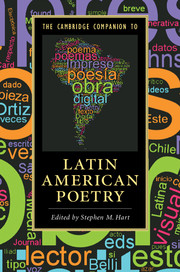Book contents
- The Cambridge Companion to Latin American Poetry
- The Cambridge Companion to Latin American Poetry
- Copyright page
- Contents
- Illustrations
- Notes on Contributors
- Preface
- Chronology
- Part I History
- Part II Six Key Figures
- 6 Sor Juana Inés de la Cruz
- 7 Gabriela Mistral
- 8 César Vallejo
- 9 Pablo Neruda
- 10 Carlos Drummond de Andrade
- 11 Octavio Paz
- Part III Diversity and Heterogeneity
- Guide to Further Reading
- Select Bibliography
- Index
- Cambridge Companions to ...
6 - Sor Juana Inés de la Cruz
from Part II - Six Key Figures
Published online by Cambridge University Press: 09 March 2018
- The Cambridge Companion to Latin American Poetry
- The Cambridge Companion to Latin American Poetry
- Copyright page
- Contents
- Illustrations
- Notes on Contributors
- Preface
- Chronology
- Part I History
- Part II Six Key Figures
- 6 Sor Juana Inés de la Cruz
- 7 Gabriela Mistral
- 8 César Vallejo
- 9 Pablo Neruda
- 10 Carlos Drummond de Andrade
- 11 Octavio Paz
- Part III Diversity and Heterogeneity
- Guide to Further Reading
- Select Bibliography
- Index
- Cambridge Companions to ...
Summary
- Type
- Chapter
- Information
- The Cambridge Companion to Latin American Poetry , pp. 99 - 112Publisher: Cambridge University PressPrint publication year: 2018
- 1
- Cited by



